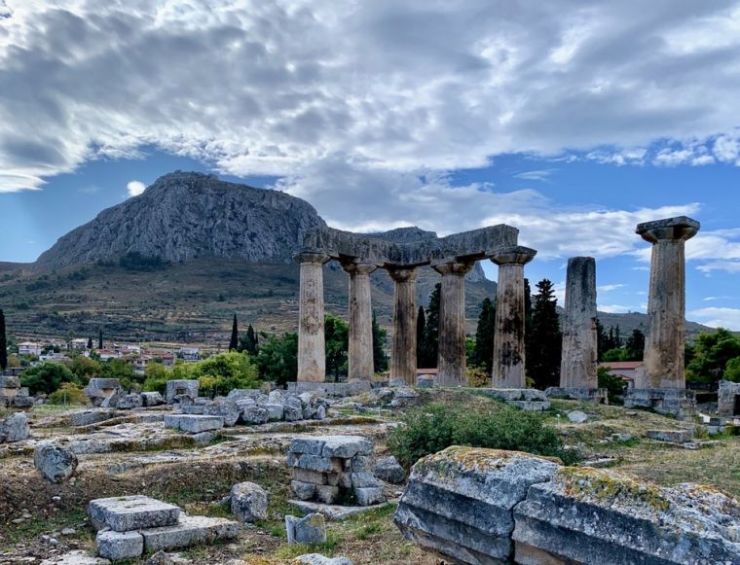
When someone brings up church history, perhaps we're minded to conjure up images of aged professors and dusty, leatherbound books. Or maybe we think of marauding medieval Crusaders, or Martin Luther with his bowl shaped haircut and long list of theological grievances.
When we talk of church history, our minds are perhaps less drawn to thoughts of small house churches huddled together in the back streets of Carthage or Ephesus. Or to the second century apologist appealing to the emperor in the face of fierce persecution.
In modern Christian contexts, church history can often be maligned, or viewed as an archaic or at best academic discipline. The study of those small house churches or fearful apologists can seem even more remote. The early church and the history of those first centuries of the Christian faith seem so far off. What can the church of 2020 AD possibly learn from the church of 120 AD?
My own interest in the early church stems from my love of the classics - the study of the Greek and Roman worlds. I set off for university to study this subject because I adored the stories and mythology of the ancient world. The richness of their literature, the vibrancy of the historical narrative, even the nuances of their language hold a certain mystique that remains deeply attractive.
But it wasn't until the last year of my undergraduate degree that I began to consider the church in this ancient context. What is so fascinating about studying the classical world is the humanity. People are at the centre of every story, every myth, every conversation. Ancient history is so enticing because we see humanity reflected on every page. And when it dawned on me that this was the world that Christ entered into, that the church spread within, it occurred to me how special the early church was.
I want to suggest that this period of church history really is special, not because it is necessarily unique, but because it is so human. And I believe that the early church has a lot to teach the church of 2020. It's for that reason that we ought to engage with church history, and especially that of the early church, so that we can learn.
There's a lot more I could say on this, but here are three good reasons why looking to the Early Church can show us how to live for Jesus today.
The Roman world: so like our own
Perhaps, at face value, a slightly surprising statement. Our 21st century lives can, at first glance, seem as different as is imaginable from the Roman world that surrounded the early church.
Ancient Rome is simply 'another time', a 'bygone era', that looks so different from our own today. A world of men and women strolling past gleaming marble columns in the hazy Italian sunshine; temples to obscure gods on every street corner; bloody gladiatorial fights; opulent baths and oppressed slaves. It's certainly not dreary suburban London or the bustle of modern-day Manchester.
But when we dig into it, the similarities between then and now are staggering.
Human history is exactly that, the story of humanity. And at the heart of Rome lies men and women not too dissimilar from us today. We find people driven by love, hate, sex, money, success. The world around us worships these things, and so did the Romans. They literally turned these things into gods.
Rome had a god for every occasion - in Aphrodite, the goddess of love; in Plutus, the god of wealth. Worship was at the heart of their culture, either manifested through their gods and goddesses, or focused on the vices of the Roman world, with rothels on every street corner, huge fortunes hoarded across the empire, and social climbers fighting one another for political success.
Our world may look different but it worships in the same way. Sometimes people misdirect their worship to false 'gods' but more often than not, we can be focused on having the perfect relationship, making the next pay grade, or being 'in' with this or that crowd.
Worship was at the heart of the Roman world, but it just wasn't the worship of the one true God. And the same is true today.
So, these two worlds are really not that far apart.
The Church doesn't fit in
The late scholar, Larry Hurtado, had this to say about religious life in the ancient world: "Practically everyone was presumed to honour the gods, and your own gods were supplied as part of your birthright."
To become a Christian, to accept the true and living God as Lord of your life, is to realign everything about who you are. It's costly. It's hard. We know this to be true today, and it certainly rang true in the ancient world.
In Rome, religious belief defined every civic event; the Christian rejected that. Religious belief determined every legal and social process; the Christian rejected that. Religious belief shaped how the family interacted: the household gods (the Lares), intimately personal to every household, were now in stark opposition to the faith of the new convert. And so the family religion, the makeup of how the very family unit defined itself; this too was rejected by the Christian.
These Early Christians stuck out so obviously because they had re-orientated their lives to focus on God alone. They'd turned their backs on the ways of the world around them, of even their own family! The Christian today sometimes has to do the same, particularly in persecution contexts.
Jesus doesn't call us to live a half-hearted life in following Him. He demands a radical realignment of our priorities. Our friends may worship sex, money and popularity, but we're called to worship Him and Him alone.
Christians have always stuck out, and as long as the world lives in rebellion to our God, we will continue to do so.
A needy world, a wonderful Gospel
The Roman world worshipped false gods. They sought satisfaction in sex, drinking, gambling and gore. But none of this would ever bring lasting joy. Our world can't tear itself away from the gods of sex, celebrity, popularity and money. But still that does not satisfy.
The greatest thing that ever happened to the Roman Empire was the life, death and resurrection of Jesus Christ, because He came to save sinners and came that we may have life to the full! And He came to save the Romans as much as he came to save anyone else. That was true in the first few centuries of church life, and it is true today. Two thousand years later, the ways we try to replace God may have changed, but the fact that mankind has rejected its Creator is ever true and His Gospel remains a universal, life-saving call to repent and believe.
This is the picture that the early church gives us - the picture of a faithful church in a hostile world, holding out the word of life. There are so many real life lessons for our own Christian contexts that we risk missing out on if we consign early church history to the dusty bookshelves and stuffy offices of university academics. I encourage you to start learning today and grow in your appreciation for the Christians who walked this path of before you. In doing so, I guarantee you'll see your own faith grow as well.
Ed Creedy blogs on early church history christianclassicist.home.blog




